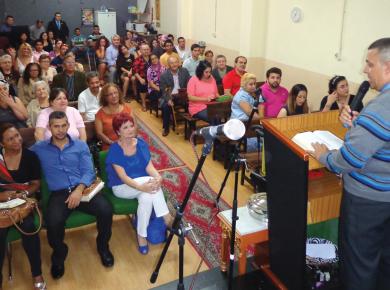Posted: July 23, 2014
La Laguna, Canary Islands – The green garage doors are unmarked, and there are no windows. The only hints of a church on the other side are the Sunday sounds of charismatic prayers and songs of praise.
Well, that, and also the lives changed by the many ministries taking place the rest of the week, spreading word of a new kind of church up and down neighborhood streets.
Iglesia Evangelica Manantial de Vida (Spring of Life Evangelical Church) is the first Anabaptist congregation in the Canary Islands, a chain of Spanish islands home to more than 2 million people off the coast of southern Morocco.
Just around the corner outside the church, the city of Santa Cruz spills down a steep slope to the island of Tenerife’s coast. The church’s impoverished La Cuesta neighborhood in La Laguna is next to a deep ravine, home to a few stacked shacks and dozens of dogs, their howls echoing from caves up and down the canyon.
Pastor Juan Ferreira had previously run a construction company behind the big green doors. Poor in funds but rich in passion, the church began when Ferreira and his wife, Lucy, felt God’s call to build a heavenly kingdom instead of earthly structures.
“God told me to close my company, and this is the garage for that company,” he said. “We began here with eight people and two mice.”
A stage with a pulpit and musical instruments replaced his office. Eight rows of benches sit in place of a truck. The building is owned by Lucy’s parents.
“Two years ago we prayed to the Lord, [asking] if this is the place,” Ferreira said. “My father- and mother-in-law hated the gospel. They live next door. The mother died. Today we see God has a purpose for this place.”
The church continued to pay the father rent, which he lived on, while the Ferreiras and the church worked to show God’s love.
“God has a purpose here,” Ferreira said. The father “was baptized a month ago. The testimony, God’s presence, is what made the change.”
Friendship connection
Through Ferreira’s work with The Gideons International, he became friends with Constain Carrillo, a fellow Gideon in Miami who has decades of experience as a pastor with the Brethren in Christ.
“Being my friend and knowing the legitimacy of his calling, I decided to introduce him to my Bishop Eduardo Llanes who, after one year of monitoring his ministry, decided to invite him to become part of the family,” said Carrillo, who this spring was appointed BIC World Missions regional coordinator for the Caribbean. “Juan enthusiastically accepted the invitation since he learned who we were and agreed to our Anabaptist view of Scripture.”
At that point, Ferreira put his own resources to work.
“They had no money to help, but I had a construction company,” he said.
Manantial de Vida, in addition to a sister congregation started six months later about 10 miles south in Añaza, are part of the U.S. BIC’s Southeast Regional Conference. In place of financial support to get started, the conference offered prayer. Ferreira was ordained and keeps in contact with a Southeast bishop.
The BIC?then commended the congregation to Anabautistas, Menonitas y Hermanos en Cristo – España (Anabaptists, Mennonites and Brethren in Christ – Spain) said secretary Dionisio Byler, who with his wife, Connie, are Mennonite Mission Network workers.
The fellowship of 12 churches and almost 500 baptized members is a Mennonite World Conference member and has connections to MMN, BIC?World Missions, Rosedale Mennonite Missions and Amor Viviente in Honduras.
Madrid-based BIC missionaries Bruce and Merly Bundy visited the church early last year.
“The rest of us got acquainted with the Ferreiras at our biennial convention held in October 2012,” Byler said. “In our yearly leadership retreat and leadership conference in February, the Manantial de Vidachurch joined our conference.”
Different kind of church
Tenerife has 900,000 residents squeezed into 785 square miles, and like mainland Spain, the population is overwhelmingly Catholic. However, Ferreira said his neighborhood has more Protestant churches than any other part of the island.
“Most people in this church are Spanish and Canarian,” he said. “In the other [Protestant] churches, it is only people from other countries. This is 90 percent Spanish.”
Locals, many of them unemployed, are drawn to how the congregation of about 70 expresses God’s love. Ferreira thinks of his pastoral role less as a teacher and more like a psychologist who emphasizes listening.
“The people see that I am closer. I understand them and I can help them,” he said. “We are together. The pastor is not up there [in the pulpit], far away. I am down here together.”
And word gets around.
“People come here from the testimony of others,” he said. “They hear what happened… . A woman came here with a cane; her knee was hurt for nine months, and we prayed for her. The next day she walked in on her own.”
Acts of God are complemented by acts of man. The church distributes items from a local food bank to people in the church and the surrounding community. On Saturdays, Ferreira picks up nearly spoiled produce to also distribute.
Anyone can come for free music lessons offered by members of the praise team. Lucy Ferreira – who also serves a pastoral role – gives reading and writing lessons to women from Romani “gypsy” families, many of whom were not allowed to learn such concepts growing up.
“I?have a conviction that the presence of God is what makes everything,” Juan Ferreira said. “If the presence of God is not in a place, things won’t work. The reason the church works here in this place is the presence of God. The people trust one another.”
Article by Tim Huber, Mennonite World Review. Distributed by permission

Comments: